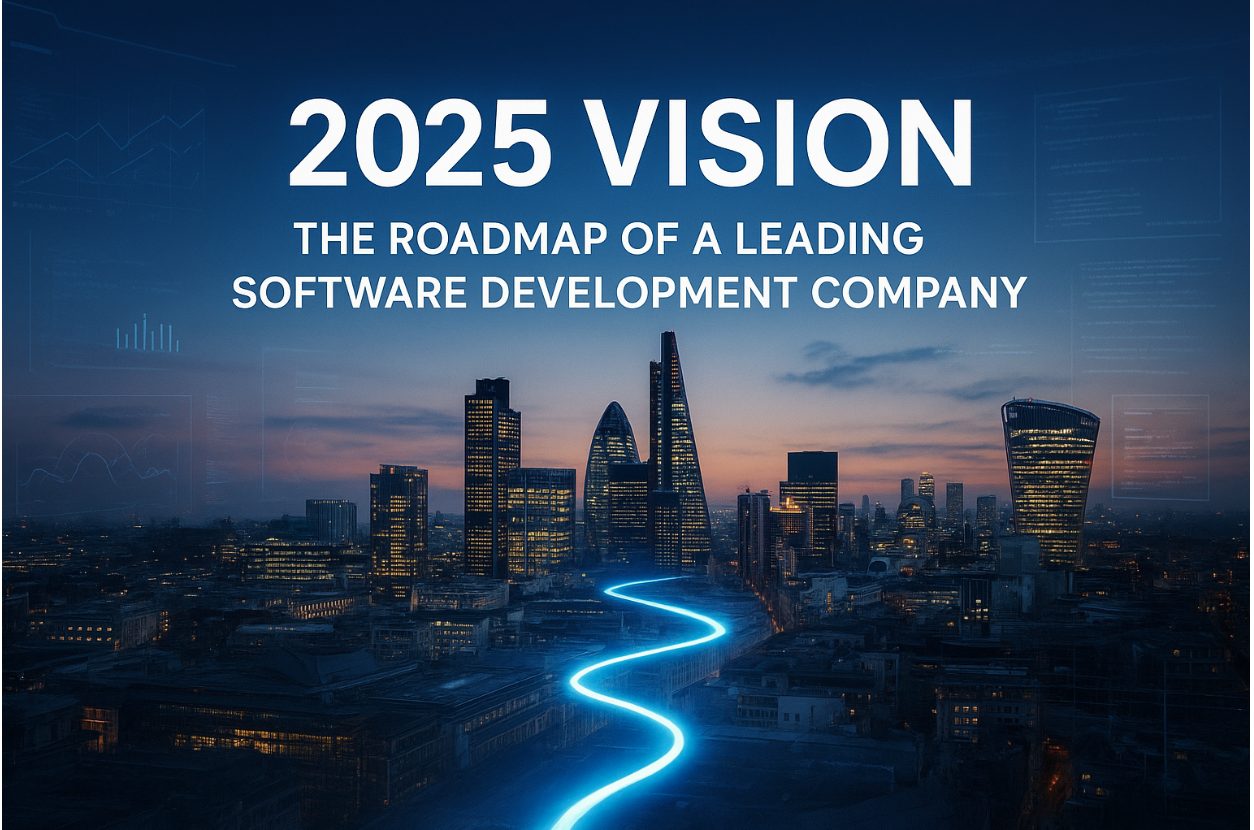
2025 Vision: The Roadmap of a Leading Software Development Company
In 2025, the software development landscape in the UK is evolving at a pace we’ve never seen before. Emerging technologies like AI, cloud-native platforms, low-code development, and quantum computing are no longer futuristic concepts; they are active forces shaping the way businesses build, deploy, and scale their digital solutions.
For business owners, startups, and tech decision-makers, understanding this transformation isn’t optional; it’s the foundation for staying competitive in a digitally-driven economy. And with the UK’s reputation as a global tech hub, the expectations on every software dev company are higher than ever.
In this article, we’ll explore the trends, challenges, and opportunities defining the future of software development UK, offering a roadmap for those aiming to work with or become a leading software development company in 2025.
What’s Driving the Software Development Industry in the UK in 2025?
The UK tech sector is now worth over £1 trillion (UK Government, 2024), making it the third in the world to hit this milestone after the US and China. Several factors are pushing software development to new heights:
- AI-First Development: Tools like GitHub Copilot and ChatGPT API integrations are accelerating coding and reducing human error.
- Cloud-First Strategies: Over 94% of UK businesses now use some form of cloud services (Statista).
- Data Privacy Regulations: Stricter UK GDPR enforcement is reshaping software architecture.
- Remote-First Teams: Distributed development models allow companies to tap into global talent while maintaining UK compliance standards.
- Sustainability in Tech: The push for green software engineering is influencing everything from code efficiency to hosting providers.
These forces are setting the stage for new opportunities but also new expectations for software development services UK.
Trend 1: AI-Driven Software Development – The New Normal
By 2025, artificial intelligence will have moved from being a developer’s assistant to a core driver of innovation. AI is being used for:
- Automated Code Generation: Reducing manual work and accelerating delivery timelines.
- Predictive Maintenance: Monitoring application performance to detect failures before they occur.
- User Experience Optimization: Leveraging data-driven personalization in real time.
For example, custom software development UK companies are now integrating AI directly into their DevOps pipelines, reducing testing time by up to 40% (McKinsey).
Voice search insight (AEO): Many executives are now asking, “How can AI speed up my software development?” This is why companies need to create content that answers questions conversationally while embedding relevant keywords.
Trend 2: Rise of Low-Code and No-Code Platforms
Low-code platforms have matured significantly, allowing even non-technical teams to prototype and deploy applications. In the UK, adoption has grown by 35% year-on-year (Gartner).
For a software dev company, this means:
- Shifting from pure coding to solution orchestration.
- Combining low-code with custom builds for complex business logic.
- Offering training to clients on platform maintenance.
Low-code doesn’t replace developers; it amplifies productivity, allowing skilled engineers to focus on the most technically demanding parts of a project.
Trend 3: Cloud-Native and Multi-Cloud Solutions
Cloud-native architecture is now the default for most leading software development company projects. Businesses are no longer content with a single provider they want multi-cloud resilience.
Benefits include:
- Reduced downtime risks through geographic distribution.
- Better compliance management with UK/EU data laws.
- Cost optimization by leveraging competitive cloud pricing.
For software development UK, multi-cloud strategies are no longer a “premium” offering; they’re a baseline expectation.
Trend 4: Sustainability in Software Engineering
Sustainable technology is becoming a C-level priority. Clients are increasingly asking:
- How energy-efficient is this application?
- What’s the carbon footprint of our data center?
The UK’s Green Software Foundation is setting new coding standards, pushing custom software development UK teams to:
- Write energy-efficient algorithms.
- Minimize unnecessary server calls.
- Optimize front-end performance for low power consumption.
Not only is this environmentally responsible, but it’s also becoming a competitive differentiator.
Trend 5: Cybersecurity-First Development
Cyber threats are escalating. In 2024 alone, UK businesses experienced 2.39 million cyber incidents (National Cyber Security Centre).
By 2025, a leading software development company is expected to:
- Implement zero-trust architectures.
- Embed encryption and compliance checks into CI/CD pipelines.
- Use AI-driven anomaly detection.
Clients now demand security-by-design, not security as an afterthought.
Challenges Facing the UK Software Development Industry in 2025
Even with these exciting advancements, challenges remain:
- Talent Shortages: Skilled developers in AI, cybersecurity, and cloud remain in high demand.
- Rising Costs: Inflation and higher energy costs impact project budgets.
- Complex Compliance: Navigating UK GDPR, industry-specific regulations, and international data laws.
- Client Education Gaps: Some businesses still underestimate the time, budget, and resources needed for quality software.
A software dev company that navigates these challenges successfully will be well-positioned to lead the market.
Opportunities for Business Owners & Startups in 2025
For decision-makers, 2025 offers unprecedented opportunities to leverage software development services UK:
- AI-Enhanced Customer Experience: Build applications that predict and meet user needs in real time.
- Global Talent Access: Remote-first hiring allows you to work with top developers worldwide.
- Rapid Prototyping: Use low-code to validate ideas quickly before committing to full builds.
- Data Monetization: Turn raw business data into actionable insights and new revenue streams.
By working with a leading software development company, businesses can strategically align these opportunities with their long-term goals.
The Roadmap for a Leading Software Development Company in 2025
To succeed, a top-tier software dev company in the UK needs to follow a roadmap that includes:
- Technology Foresight: Staying ahead of AI, blockchain, AR/VR, and quantum computing developments.
- Agile + DevOps Mastery: Delivering projects faster without sacrificing quality.
- Security-by-Default: Embedding security at every stage of development.
- Client Collaboration: Co-creating solutions with transparency and shared ownership.
- Continuous Learning: Investing in ongoing staff training to keep skills relevant.
Conclusion
The UK software development industry is entering its most dynamic phase yet. From AI-driven workflows to sustainable engineering and cybersecurity-first practices, the next generation of applications will be smarter, faster, and more user-focused than ever.
For business owners, startups, and tech leaders, the takeaway is clear: choose a partner who understands the new rules of the game. A leading software development company in 2025 will not only deliver robust, scalable software but also align with your vision for innovation, security, and sustainability.
One such company in the UK, renowned for delivering cutting-edge custom software development solutions across various industries, has been at the forefront of AI integration, cloud-native strategies, and security-first design, enabling businesses to thrive in the fast-paced digital economy.
The future is here, and it’s being built in code. The question is, are you ready to be part of it?



 Bitcoin
Bitcoin  Ethereum
Ethereum  Tether
Tether  XRP
XRP  USDC
USDC  Solana
Solana  TRON
TRON  Lido Staked Ether
Lido Staked Ether  Cardano
Cardano  Avalanche
Avalanche  Toncoin
Toncoin